|
|
|
Sort Order |
|
|
|
Items / Page
|
|
|
|
|
|
|
| Srl | Item |
| 1 |
ID:
148465
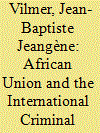

|
|
|
|
|
| Summary/Abstract |
In October 2016, South Africa became the first nation to withdraw from the Rome Statute of the International Criminal Court (ICC), after Burundi began taking steps to leave it. Kenya is likely to follow, and other states, like Uganda, could take the same cue. The ICC is facing the most serious diplomatic crisis of its history, with the African Union (AU) denouncing double standards, neo-colonialism and ‘white justice’, and regularly threatening to withdraw from the Rome Statute en masse. This article adopts both an interdisciplinary and a pragmatic policy-oriented approach, with the aim of producing concrete recommendations to counteract the crisis. It firstly outlines the context of this crisis which, although not new, is becoming increasingly serious. It then responds to the AU's objections to the ICC. The court's ‘Afro-centrism’ is explained by objective facts (the occurrence of mass crimes taking place on the African continent, the large number of African parties to the Rome Statute, the principle of complementarity) as well as by subjective decisions (a convergence of interest between the African leaders who brought the cases to the court themselves to weaken their opponents, and the prosecutor who needed quickly to find cases). Afro-centrism should also be nuanced, as the ICC has already shown an interest in cases outside Africa and the extent to which it is a problem is a matter of perspective. The article also responds to the ‘peace vs justice’ objection, and emphasises that African states were instrumental in creating and sustaining the ICC. It finally formulates recommendations to ease relations between the ICC and AU, such as to investigate more outside Africa, reinforce African national jurisdictions, create intermediary institutional structures, promote regional-level action, and rely more on ICC-friendly African states and African civil society.
|
|
|
|
|
|
|
|
|
|
|
|
|
|
|
|
| 2 |
ID:
148472
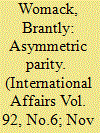

|
|
|
|
|
| Summary/Abstract |
The period 2008 to 2015 is likely to prove a traumatic transition from the post-Cold War era of American unipolar hegemony to a new status quo of asymmetric parity between the US and China. With approximately equal masses of production and one third of the world's total, the relationship of the United States and China will remain the focus of global politics for the foreseeable future. While parity in economic mass makes each the greatest concern of the other, their asymmetry in wealth, developmental levels, and geopolitical concerns makes unnecessary a power transition scenario. Hitherto the analysis of parity has assumed symmetry, and therefore the point of power transition and challenge is highlighted and strategy has focused on relative gain vis-à-vis the rival. With asymmetric parity the transitional moment becomes ambiguous, and it is a reasonable strategy for each side to pursue absolute gain. Sustainable asymmetric rivalry is competitive, but it can also be win-win. Moreover, neither the US nor China—nor the two together—can exercise the kind of hegemonic control that was the premise of earlier bipolar and unipolar eras. The diffuse interdependence created by globalization gives every state broader alternatives and raises the cost of hostility. The US and China do not face each other as hegemon and challenger, but rather as the largest, but quite different, players in a multinodal world that neither controls.
|
|
|
|
|
|
|
|
|
|
|
|
|
|
|
|
| 3 |
ID:
148464
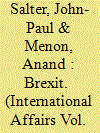

|
|
|
|
|
| Summary/Abstract |
Even though the opinion polling before the British referendum on membership of the European Union showed a narrow gap between the two sides, the actual result—a vote to leave—on the morning of 24 June 2016 came as a surprise to many. Yet in truth both the referendum and its outcome had deep roots in British politics. In this article we cast an eye over the history of Britain's relationship with the EU, which has long been marked by a mixture of awkwardness and successful influence. We trace the origins of the referendum in long-run tensions between, and within, the political parties, and in the lukewarm public support for European integration. We also examine more contingent, short-term factors relating to the referendum campaign itself. We conclude by commenting on the divisions exposed by the vote along lines of geography, education, class and wealth, and suggest that reconciling these with the continuing tensions in the party landscape make a clean and speedy exit from the EU unlikely.
|
|
|
|
|
|
|
|
|
|
|
|
|
|
|
|
| 4 |
ID:
148471


|
|
|
|
|
| Summary/Abstract |
The rise of big data has brought with it enormous possibilities, for better or worse. In China, the government has been enthusiastically preparing for the coming of the era of big data. This article examines how the authoritarian regime in China has been employing big data to improve its governance and to move towards a ‘Big Brother 2.0’ model. The regime has combined cooptation with coercive control to exploit digital technology, in order to maximize its utility and thus maintain authoritarian rule. Moreover, existing debates on digital technology largely focus on the changing power structures between state and society, but neglect power structures within regimes and their implications for authoritarianism. This article argues that the use of massive digital data may backfire against the authoritarian regime as it may change the power structure within the state. That is to say, efforts to embrace big data may also undermine the authoritarian rule. A more accurate understanding of the Chinese authoritarian regime's resilience and vulnerability in the information age will help us grasp the essence of China's rise as a fragile global power.
|
|
|
|
|
|
|
|
|
|
|
|
|
|
|
|
| 5 |
ID:
148473


|
|
|
|
|
| Summary/Abstract |
In 1939–45 an economic group for the discussion of postwar economic order was established at Chatham House, gathering a transnational community of economists and scholars at 10 St James Square in London. Papers were written and seminars were held before—and following—the conference held in Bretton Woods in 1944. Polish-born economist Paul Rosenstein-Rodan (1902–1985) coordinated the group, which invoked investment-led growth and new international institutions for development. Chatham House played a role in making sense of, and disseminating, this new culture of international development. To be clear, this ‘new’ culture was not entirely new, and had its roots in the interwar years, including colonial development policy. Nor was Chatham House the only hub of this culture. This article aims at filling a gap in our understanding of the role of economic research done at Chatham House during the Second World War. In addition, by looking to the past, it may also help at broadening our views on how to globally reignite growth today. Policy-makers seem to have learnt some of the monetary lessons of the 1930s, but not the development ones of the 1940s. This article is based on sources from the Chatham House archive and brings to special attention articles published in International Affairs.
|
|
|
|
|
|
|
|
|
|
|
|
|
|
|
|
| 6 |
ID:
148475


|
|
|
|
|
| Summary/Abstract |
Food insecurity occurs when people do not have secure access to food necessary for a healthy life. The food-insecure are typically the poor, and the traditional focus of food insecurity thinking has been the global poor. Increasingly, it is being recognized that in the rich world, food insecurity manifests itself in calorie-rich but nutrient-poor diets, leading to the linkage between poverty, obesity and its associated health problems. Furthermore, the historical link between income and diets, when projected forwards, shows a growth in demand that would be extremely challenging to meet with sustainable production. This is especially true given that emissions from the food system are significant contributors to climate change, perhaps more so than any other sector; and yet, probably less than half the world's calories are used directly for healthy diets (over half of agricultural production is lost or wasted, fed to animals or consumed in excess of healthy requirements). This review article, of a suite of four books, covers the way the food security argument is framed and how this is changing, food politics and justice and why our food system is as it is. The overall conclusion is that our food system is placing unsustainable demands on the planet, as well as creating injustice and inequity. The ‘productivist paradigm’ of growing ‘ever more, ever more cheaply’ while relying on international commodity trade and markets to solve the distributional issues, is unlikely to create a sustainable, just and food-secure world.
|
|
|
|
|
|
|
|
|
|
|
|
|
|
|
|
| 7 |
ID:
148469
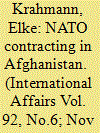

|
|
|
|
|
| Summary/Abstract |
Private military and security companies (PMSCs) play a growing role in international military and peacekeeping operations. Very little is known, however, about the fact that not only the United States relies extensively on contractors, but so do international organizations such as the North Atlantic Treaty Organization (NATO). This article examines NATO's collaboration with PMSCs during its leadership of the International Security Assistance Force in Afghanistan (ISAF, 2001–2014). It argues that NATO's use of international prime contractors and holding PMSCs responsible for their own security contributed to the creation of a complex network of contractors and subcontractors with detrimental effects for control and accountability. In particular, this article focuses on the proliferation of local Armed Private Security Companies (APSCs) which were accused of a wide range of humanitarian and human rights abuses. Drawing on principal–agent theory, this article seeks to explain why NATO appeared unable to stop the ‘culture of impunity’ among these firms. It shows that multiple principals and long principal–agent chains undermined NATO oversight over armed security guards. In addition, some principals and agents avoided accountability for APSC misconduct through three strategies: blame-shifting, back-scratching and morphing. NATO contracting practices, thus, had serious negative implications for the security of the civilian population and the ability of ISAF to establish lasting peace in Afghanistan.
|
|
|
|
|
|
|
|
|
|
|
|
|
|
|
|
| 8 |
ID:
148468
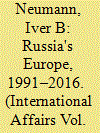

|
|
|
|
|
| Summary/Abstract |
Russia defines itself as a Great Power in relation to Europe and the West. The first part of the article traces how, since 1991, a story about greatness centred on being part of contemporary European civilization has given way to a story of how Russia is great by being superior to a Europe that is now seen as rotten and decadent. The former story spelled cooperation with Europe and the West, where the latter spells confrontation. The second part argues that Russia's superiority complex is unsustainable. It is hard to see how, in the face of the formative structural pressure of the state system, Russia will be able to sustain its superiority complex. A state that does not order itself in such a way that it may either gain recognition as a Great Power by forcing its way and/or by being emulated by others, is unlikely to maintain that status. The costs of maintaining Great-Power status without radical political and economic change seem to be increasing rapidly. If Russia wants to maintain its status, an about-turn is needed. Such a turn may in itself be no solution, though, for if Russia does not do anything about the root causes of its perceived inferiority to Europe, then the Russian cyclical shifting from a Westernizing to a xenophobic stance will not be broken.
|
|
|
|
|
|
|
|
|
|
|
|
|
|
|
|
| 9 |
ID:
148466


|
|
|
|
|
| Summary/Abstract |
Since the warring parties to South Sudan's civil war (2013–15) signed a peace agreement in August 2015, South Sudan has endured a series of setbacks and clashes that have threatened the fragile peace process. This article examines many key factors affecting the peace process, including rampant corruption, military factionalism, gross human rights abuses and ineffective foreign intervention/pressure. It shows that the past and present failure to structure accountability at the institutional level drives the instability and distrust that has limited the political dialogue and consensus needed to implement the peace deal. To frame this issue of accountability, the article distinguishes between core (essential) and peripheral (self-serving) objectives of promoting accountability. In doing so, it seeks to devise and apply the logic of this dynamic of accountability and to explain the unexpected outcomes of South Sudan's conflict. It argues that, rather than transforming the conditions and hostile relations of South Sudan's situation, international demands for accountability continue to fuel the volatile tensions between international authorities and the various factions inside the Sudan People's Liberation Movement/Army (SPLM/A). The central conclusion the article draws is that instead of signifying the official beginning of the end of the conflict, the peace agreement has wedged itself between the core and peripheral objectives of accountability, thereby setting the stage for further stalemate and increasing distrust among domestic and international authorities.
|
|
|
|
|
|
|
|
|
|
|
|
|
|
|
|
| 10 |
ID:
148467


|
|
|
|
|
| Summary/Abstract |
The struggle against terrorism in the Middle East, and the success of the Islamic State in Iraq and Syria in its use of social media to spread its ideas, has led to a search for new messages to counter the appeal of violent extremists. Thus far, United States counter-messaging has failed to articulate a normative position that is compelling to its target audiences. The US has also not found an effective way to speak to and with other parts of the Muslim world. The article shows that these failures are not accidental but reflect profound factors in American culture and society. The US’ normative position has also failed to take into account the crucial differences between ‘liberals’ and ‘moderates’ in the Muslim world. To proceed one must acknowledge that there are two fundamentally different interpretations of Islam, both of which are supported by a close reading of the Qur’an and other major texts. To draw on that difference, the article shows, requires drawing on voices and resources not available in the US. The article proposes a way forward that both acknowledges the inherent weaknesses and liabilities of the US government as a messenger and points to more credible messengers within the Muslim world.
|
|
|
|
|
|
|
|
|
|
|
|
|
|
|
|
| 11 |
ID:
148470
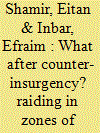

|
|
|
|
|
| Summary/Abstract |
This article argues that the option of a military raid is becoming more relevant in the contemporary strategic environment. Two developments lead to this conclusion: the increase in the number of so-called failed states and subsequently ungoverned areas; and the western inadequate response in the attempts to create zones of stability with clear strategic addresses. The efforts for statebuilding in Iraq and Afghanistan have failed, and the US and its allies have realized that foreign interventions, even after the commitment of much treasure and blood, are ineffective. This means that the West must adapt its strategic thinking to the new developments and devise ways to deal effectively with the situation. This article explores the concept of strategic raid and elaborates on its theoretical underpinnings. The raids discussed here are military operations conducted in order to weaken and/or deter a non-state actor, at least temporarily. In the absence of diplomatic and economic leverage, the aim is limiting the actor's ability to harm others. The use of force is designed to degrade the military capabilities of the non-state adversary and to influence its resolve. Subsequently, it discusses a few historical examples of raiding strategy and then analyses two contemporary cases, Israel and the United States, in order to demonstrate the utility of raids today. Finally, the relevance of raiding strategy for other states in the contemporary strategic environment is discussed.
|
|
|
|
|
|
|
|
|
|
|
|
|
|
|
|
| 12 |
ID:
148474


|
|
|
|
|
| Summary/Abstract |
The four books under review focus on different aspects of war and conflict, but they all make it clear that women and children are more than their victims. They can be, and often are, active participants in all dimensions of conflict, from taking up arms to working for peace. While all four books paint an appropriately grim picture of war and its impact, there is also some optimism to be found in the resilience shown by women and children as they face the brutality of war and often actively seek to work for peace. Three of the books examine women's involvement in conflict, war, peace and peacemaking, and the aftermath of these events, albeit in very different ways—although all view women as active participants in the process rather than as victims. The fourth book included in this article, Children and global conflict, is not only relevant to the discussion, but also provides another important lens through which we can examine issues of conflict, war and peace. This review article provides insight into the contrition made to the field by these recent books individually, as well as when considered as parts of a whole.
|
|
|
|
|
|
|
|
|
|
|
|
|
|
|
|
|
|
|
|
|